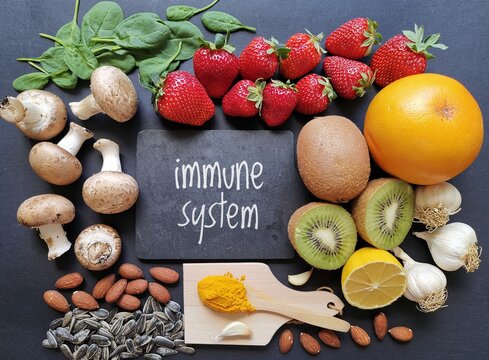Introduction A strong immune system is essential for overall health and protection against diseases. In today’s fast-paced world, people often rely on medications, but natural immunity boosters are equally, if not more, effective in keeping illnesses at bay. By incorporating healthy habits into your daily routine, you can enhance your body’s ability to fight infections
Introduction
A strong immune system is essential for overall health and protection against diseases. In today’s fast-paced world, people often rely on medications, but natural immunity boosters are equally, if not more, effective in keeping illnesses at bay. By incorporating healthy habits into your daily routine, you can enhance your body’s ability to fight infections naturally. In this article, we will explore simple yet effective ways to strengthen your immune health using food, lifestyle changes, and natural remedies.
1. Eat a Nutrient-Rich Diet

Image by: Yandex.com
What you eat directly Impacts your Immune System. A well-balanced diet filled with essential vitamins and minerals supports your body’s natural defenses. Foods rich in antioxidants, vitamins, and probiotics help fight off infections and improve overall immune function.
- Vitamin C-rich foods – Citrus fruits like oranges, lemons, and grapefruits boost immunity.
- Vitamin D sources – Sunlight exposure, eggs, and fatty fish enhance immune response.
- Zinc intake – Nuts, seeds, and legumes help maintain a strong immune system.
- Probiotic-rich foods – Yogurt, kefir, and fermented vegetables support gut health, which is crucial for immunity.
- Protein sources – Lean meats, fish, and plant-based proteins repair body tissues and aid in defense mechanisms.
2. Stay Hydrated
Water plays a vital role in flushing out toxins from your body. Dehydration can weaken your body’s ability to fight infections. Drinking enough fluids ensures that your immune cells function efficiently.
- Aim to drink at least 8 glasses of water daily.
- Herbal teas, coconut water, and fresh fruit juices can also contribute to hydration.
- Reduce caffeine and alcohol, as they can dehydrate the body.
3. Get Enough Quality Sleep
Your body repairs and regenerates itself while you sleep. A lack of sleep weakens the immune system, making you more prone to infections.
- Aim for 7-9 hours of quality sleep per night.
- Avoid screens and heavy meals before bedtime.
- Establish a bedtime routine to improve sleep quality.
- Keep your room dark and cool for better sleep.
4. Manage Stress Levels
Chronic stress can weaken your immune response. When your body is under stress, it releases cortisol, a hormone that suppresses immune function.
- Practice deep breathing exercises or meditation.
- Engage in relaxing activities like reading, painting, or listening to music.
- Spend time in nature or practice yoga.
5. Regular Exercise for a Strong Immune System

Image by: Yandex.com
Physical activity is a powerful immune booster. Moderate exercise improves circulation, reduces inflammation, and enhances immune cell activity.
- Engage in at least 30 minutes of moderate exercise daily.
- Activities like walking, cycling, swimming, and strength training are beneficial.
- Avoid excessive workouts, as they can have a negative impact on immune health.
6. Maintain a Healthy Gut
Your gut is home to trillions of bacteria that play a crucial role in immunity. A balanced gut microbiome strengthens your immune defenses.
- Consume fiber-rich foods like whole grains, vegetables, and fruits.
- Take probiotics or fermented foods like kimchi, kombucha, and miso.
- Avoid processed foods and excess sugar, which harm gut bacteria.
7. Limit Sugar and Processed Foods

Image by: Yandex.com
Excess sugar and processed foods can suppress immune function and lead to inflammation in the body.
- Opt for natural sweeteners like honey or stevia.
- Reduce intake of junk food and refined carbohydrates.
- Focus on whole, unprocessed foods that nourish the body.
8. Sunlight and Vitamin D
Vitamin D is Essential for Immune Regulation. Sunlight exposure is the best natural source of Vitamin D.
- Spend 15-30 minutes in the sun daily.
- If sunlight is limited, take a Vitamin D supplement.
- Consume foods rich in Vitamin D, such as mushrooms, eggs, and fish.
9. Herbal Remedies and Natural Supplements

Image by: Yandex.com
Several herbs and natural supplements have been proven to boost immune function.
- Turmeric – Contains curcumin, a powerful anti-inflammatory compound.
- Ginger – Helps fight infections and reduces inflammation.
- Garlic – Has antibacterial and antiviral properties.
- Elderberry – Supports immune health and fights colds and flu.
- Green Tea – Rich in antioxidants that enhance immune response.
10. Avoid Smoking and Excessive Alcohol

Image by: Yandex.com
Both smoking and heavy alcohol consumption weaken the immune system, making you more susceptible to infections.
- Quit smoking or reduce exposure to tobacco products.
- Limit alcohol intake and opt for healthy alternatives.
- Stay mindful of substances that compromise immune health.
Relevant Table: Nutrients and Their Role in Immunity
| Nutrient | Sources | Immune Benefits |
|---|---|---|
| Vitamin C | Oranges, Kiwi, Bell Peppers | Boosts white blood cell production |
| Vitamin D | Sunlight, Salmon, Eggs | Enhances immune response |
| Zinc | Nuts, Seeds, Legumes | Supports immune cell function |
| Probiotics | Yogurt, Kefir, Kimchi | Improves gut health |
| Antioxidants | Green Tea, Berries, Spinach | Protects cells from damage |
Conclusion
Strengthening your immune system naturally is possible with simple lifestyle changes. By maintaining a nutrient-rich diet, staying hydrated, exercising, managing stress, and getting adequate sleep, you can enhance your body’s defenses. Incorporating natural herbs and vitamins, avoiding processed foods, and staying active contribute to long-term immune health. A healthy immune system not only protects you from infections but also improves your overall quality of life. Start implementing these changes today to build a resilient and strong immune system!
















